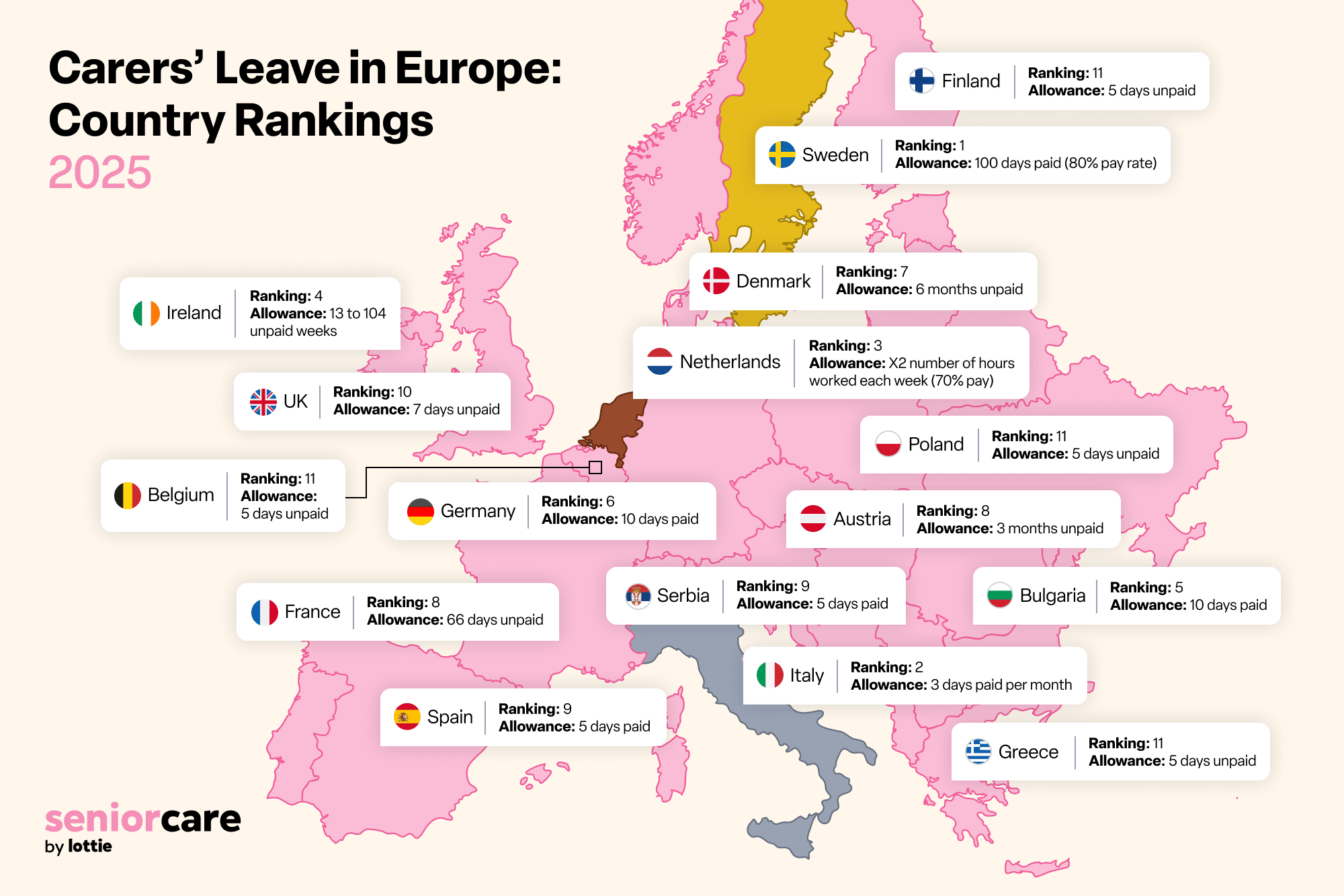One Year On From The Carer’s Leave Act - The UK Is Falling Behind In Supporting Working Carers

Estimated Reading Time: 10 minutes
To mark the first anniversary of the UK’s Carer’s Leave Act (6 April 2025), Seniorcare by Lottie has analysed carer leave policies across Europe, revealing that the UK offers minimal support for employees with caregiving responsibilities compared to neighbouring countries.
The UK’s Carer’s Leave Act allows just one week of unpaid leave, falling behind many European nations with more generous policies. Sweden leads the way with 100 days at 80% pay, while Italy ranks in second place with a highly flexible approach to eldercare support in the workplace, offering three days of paid leave a month. Germany (ranking in joint 5th place) takes a balanced approach, offering both 10 days of paid leave and up to six months unpaid for long-term care.
Below, we’ve highlighted the support available for carers throughout Europe, along with how support for informal carers can be improved in the workplace and the benefits of doing this.
We help employers provide bespoke carer policies
Let’s chat about the benefits you can offer.
European Countries Ranked by Support for Carers
| Rank (Highest to Lowest) | Country | Carer's Leave Allowance (Per Year) |
|---|---|---|
| 1 | Sweden | 100 days paid (80% pay rate) |
| 2 | Italy | 3 days paid per month |
| 3 | Netherlands | x2 number of hours worked each week (70% pay) |
| 4 | Ireland | 13 to 104 unpaid weeks |
| 5 | Bulgaria | 10 days paid |
| 5 | Germany | 10 days paid |
| 6 | Denmark | 6 months unpaid |
| 7 | Austria | 3 months unpaid |
| 8 | France | 66 days unpaid |
| 9 | Spain | 5 days paid |
| 9 | Serbia | 5 days paid |
| 10 | UK | 7 days unpaid |
| 11 | Poland | 5 days unpaid |
| 11 | Greece | 5 days unpaid |
| 11 | Belgium | 5 days unpaid |
| 11 | Finland | 5 days unpaid |
While the EU mandates a minimum of five days of unpaid leave, the table above shows that many EU countries go beyond this requirement:
Sweden - Offers the most generous policy, with up to 100 days of leave at 80% pay.
Italy - Provides a highly flexible approach, allowing up to three days of paid leave per month to support employees in regularly caring for elderly loved ones.
Netherlands - Offers leave based on an employee’s contracted hours, allowing double the number of hours worked a week at 70% pay.
Ireland - Provides a flexible carer’s leave policy ranging from 13 weeks to 104 weeks per year. While unpaid, this extended period allows employees to manage caregiving responsibilities effectively.
Bulgaria - Offers 10 days of paid leave, ensuring financial stability for carers needing time off.
Germany - Allows up to 10 days of paid leave. However, those with longer-term care commitments are entitled up to six months of unpaid leave.
Denmark - Allows up to six months of unpaid leave annually, giving carers flexibility in managing work and caregiving duties.
Austria & France - Both offer up to three months of unpaid leave to help employees balance work and caregiving.
Spain & Serbia - Both go beyond the EU minimum by providing five days of paid leave per year.
UK - The UK allows up to one week of unpaid leave, depending on an employee's contracted days. For example, three days of Carer’s Leave are allowed if an employee is contracted to a three-day working week.
Poland, Greece, Belgium & Finland - These countries offer the EU minimum of five days of unpaid leave. The UK allows up to one week of unpaid leave, aligning with this standard.

The UK Ranks 10th In Europe For Carer Leave Provision
The UK’s Carer’s Leave Act makes it law to offer all employees up to 7 working days of unpaid leave to care for a loved one. This act has been a stepping stone in recognising the key role informal carers play in society.
While the UK has made progress in supporting informal carers in the workplace, our analysis shows there is still plenty to learn from other European countries, especially when it comes to generous and flexible carers leave policies, particularly in terms of paid leave.
With an ageing population, more employees are now balancing work with caring for elderly dependents rather than children, making it more important than ever before for employers to provide meaningful support for informal carers in the workplace. Looking to neighbouring EU countries, we can learn valuable lessons in flexibility, longer-term commitment, and financial support that can progress the way we approach carers' leave here in the UK.
With an ageing population and increased demand for care, informal carers are on the rise. However, many countries across Europe, including the UK, are falling behind in offering appropriate support.
As an employer, there are lots of practical steps you can take to offer enhanced support for employees juggling work and care commitments that go beyond the UK standard legislation of one week of unpaid leave, to better support employees in the workplace.
Five Ways To Enhance Support For Informal Carers At Work
1. Offer a clear carer policy
It’s important to go beyond the minimum requirements of UK legislation and proactively develop a clear policy for carers that works for both your business and employees.
A dedicated carers' policy within your HR guidelines can outline the support your business offers, such as flexible working arrangements, guidance on career breaks, mental health resources, and additional leave options. By taking this step, you’ll create a more supportive and adaptive workplace for employees balancing work and caregiving responsibilities.
2. Flexible working
Flexibility in working patterns can help employees with caregiving responsibilities feel supported in balancing their work commitments and care responsibilities. For example, incorporating hybrid working or flexi-time options can offer informal carers greater flexibility to manage their time.
3. Create a workplace carer support network
Being an unpaid carer can sometimes feel isolating, especially when juggling lots of commitments, so it’s important to be able to lean on a support network.
By being proactive and creating a caregiver support group at your workplace, you can help caregivers feel supported and connected to others in similar situations. Support groups can also help share valuable tips and techniques for managing caregiving responsibilities with other caregivers.
Similarly, many support groups for carers are available across the UK, including through Carers UK and Age UK. Sharing local support groups in your area can help caregivers find a valuable support network.
4. Offer manager training
To enhance the support you offer to carers, it’s important that all managers are trained and correctly informed on the best steps to help an informal carer. They should also be aware of all the available resources to signpost to their team.
5. Offer practical support in finding care
Finding care for a loved one can be daunting, but with the right support and guidance, navigating the process to find the best care option for an elderly relative can feel less overwhelming.
You may find it helpful to share any local care homes, or at-home help services in the area, in a shared community space.
Alternatively, more businesses are becoming increasingly aware of the benefits surrounding eldercare benefits. Since the Carer’s Leave Act was introduced in April 2024, Seniorcare by Lottie has seen a 141% increase in employer demand, as businesses recognise the value of eldercare benefits. Similarly, with more employees balancing work and caregiving, Seniorcare’s services have experienced a 41% rise in employees using services to find care options for their elderly loved ones.
The Benefits Of Offering Enhanced Carer Support in the Workplace
Trixi Koos, Senior Rewards and Benefits Manager at Unilever, has shared the importance of recognising informal carers in the workplace and the positive impact of offering enhanced benefits that go beyond the UK’s standard Carer’s Leave Act legislation provides for both businesses and employees:
“During informal check-ins with HR, our Line Managers and our Carers Network, many employees revealed to us that they were silently juggling work responsibilities with caring for ageing parents or relatives. Some were spending hours researching care options, making calls during their lunch breaks, or taking emergency leave when care arrangements fell through. Without a structured support system, these caregivers were trying to navigate the complex eldercare landscape alone, often at the expense of their wellbeing and performance. That's when we realised we needed a comprehensive solution.
The demographic reality we're facing makes caregiver support absolutely critical today. Our ageing population means more employees are becoming part of the 'sandwich generation' - caring for both children and elderly parents simultaneously. The emotional, financial, and logistical strain this can put on the workforce is immense. With care costs rising and navigating the care system becoming increasingly complex, employees need expert guidance more than ever. Without proper support, we risk losing valuable talent to caregiver burnout as they may struggle to balance their responsibilities. In today's competitive talent market, supporting caregivers isn't just compassionate - it's essential for organisational resilience and success.
To better support our employees who are juggling work and caregiving commitments, we partnered with Seniorcare by Lottie in 2022 and it has been transformative for our caregiving employees. Employees particularly value the financial guidance on pricing and contracts, which has helped many avoid common pitfalls and unnecessary expenses. Perhaps most importantly, having this professional support available has given them peace of mind, knowing they're making informed decisions for their loved ones while maintaining their career momentum. We have a very active Carers Network community within our company and they have found it particularly useful to engage with a professional company like Seniorcare by Lottie.”
Seniorcare by Lottie helps unpaid carers juggle work and caregiving responsibilities
“From an organisational perspective, Seniorcare by Lottie has been an exceptional investment. Employees who have engaged with the service have told us about their improved work-life balance as they no longer felt forced to choose between their career and family obligations.
This benefit has enhanced our employer brand, helping us attract top talent who value family-supportive policies. Our employees appreciate that we recognise and support their whole lives, not just their work identities.
Ultimately, the service pays for itself through improved productivity and strengthened organisational culture.
The three most significant improvements since implementing Seniorcare by Lottie have been remarkable:
As our employees now have professional support to help them create stable, reliable care arrangements, employees who have accessed services offered by Seniorcare by Lottie have fewer eldercare emergencies and unplanned absences.
Our caregivers are reporting lower stress levels and better work-life balance.
The service has strengthened our inclusive culture, caregivers have told us that they feel acknowledged and supported rather than having to hide their responsibilities, leading to more open conversations and a more authentic workplace environment where people can bring their whole selves to work.”
Methodology:
To mark the one-year anniversary of the Carer's Leave Act in the UK, we aimed to understand the uptake of carer support in the UK and compare it to other European countries.
To achieve this, we analysed carer leave policies across 20 European countries to identify the differences in policy allowances. To assess which countries offer the most generous or flexible policies, these were ranked on a scale of 1 to 10, based on two key factors:
The total number of days of carer leave offered.
The number of paid days included within their policy.
Learn More About Seniorcare by Lottie
For more information on eldercare benefits, check out Seniorcare by Lottie, the UK’s leading eldercare employee benefit solution. Seniorcare combines clever technology and human expertise to provide much-needed support for employees who juggle work and caring for an elderly dependent.
Seniorcare by Lottie is designed to relieve any burden when it comes to care and work. With the Carer’s Leave Act becoming law on April 1st, we’re seeing a sharp increase in companies adding eldercare support as an employee benefit, including some of the biggest businesses in the UK. Join us in empowering your workforce and reshaping employee wellbeing together.



